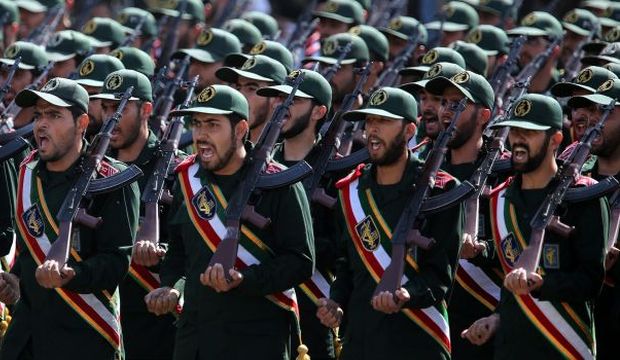
Iranian Islamic Revolutionary Guard Corps soldiers march during an annual military parade in Tehran, Iran, on September 22, 2013. (EPA/Abedin Taherkenareh)
London, Asharq Al-Awsat—Heavy fighting between Iran’s Islamic Revolutionary Guard Corps and a Baluch Sunni rebel group called Jaish Al-Adl broke out on Tuesday morning in Iran’s southeastern province of Sistan and Baluchistan.
Heavy clashes were reported between the Revolutionary Guard forces and the Baluch rebels with the former issuing a statement acknowledging that “rebels and armed terrorists entered Iranian territory aiming to take over the Askan border post in Saravan.”
The statement added that the incursion was swiftly dealt with by Revolutionary Guard infantry units, local forces and pro-regime Baluch militias who managed to inflict heavy losses on the Jaish Al-Adl fighters, forcing them to retreat.
The Revolutionary Guard statement claimed the rebel forces organized the ambush from Pakistani territory and returned there after being forced to retreat.
Iran’s Edalat News, a media outlet that caters to Iran’s Sunni community, published a statement from Jaish Al-Adl, who portrayed the operation as a success.
“Rebel forces managed to kill 10 regime soldiers and completely destroy the Askan border post by sending a 600-kilogram [1,323-pound] explosive device fitted on a car into the compound and triggering it remotely,” the statement said.
The province of Sistan and Baluchistan has experienced a number of armed attacks from anti-regime Baluch groups over the last few years. Earlier this year, 13 Iranian border guards were killed and another five abducted in an ambush in the southeastern province.
The surge in rebel attacks on the eastern border led to Iran’s border forces handing over security for the border to the Revolutionary Guard, resulting in additional military personnel and weaponry being deployed to the region.
The majority of Iran’s Baluch population are Sunnis, many of whom feel disenfranchised by the Shi’ite central government. Dissatisfaction with central government policies in Iranian Baluchistan is not limited to Tehran’s religious and sectarian policies, but also the result of economic deprivation and a controversial assimilation policy which the Baluch people view as a threat to their identity.
The province is comprised of the two vast and historically important regions of Sistan and Baluchistan. Sistanis are mostly Shi’ite and speak Persian while Baluchs are Sunni and speak the Baluchi language.
The latest clashes between government forces and Sunni Baluch fighters is part of a broader confrontation between the Shi’ite-led government and Iranian Sunnis, particularly amid fears of the spread of the Islamic State of Iraq and Syria (ISIS) in neighboring Iraq.
Speaking on Tuesday, Iranian Interior Minister Abdolreza Rahmani Fazli said: “A number of individuals who came from Pakistan and Afghanistan to Iran to join ISIS forces in northern Iraq have been arrested.”
“Although there is no recruitment operation for ISIS inside Iran, the group is active to promote its cause and is inviting some segments of the Iranian population to sign up through the Internet as well as contacting potential volunteers via telephone,” he added.
Following the military advances secured by ISIS in northern Iraq, Iranian officials have sought to reassure the Iranian people that ISIS does not pose a threat to Iranian territory.
Although Tehran has been able to protect its western borders from ISIS infiltration, Iran’s east remains vulnerable due to the growing presence of Sunni rebel groups and escalating clashes with central government forces which represent a longstanding security threat.
